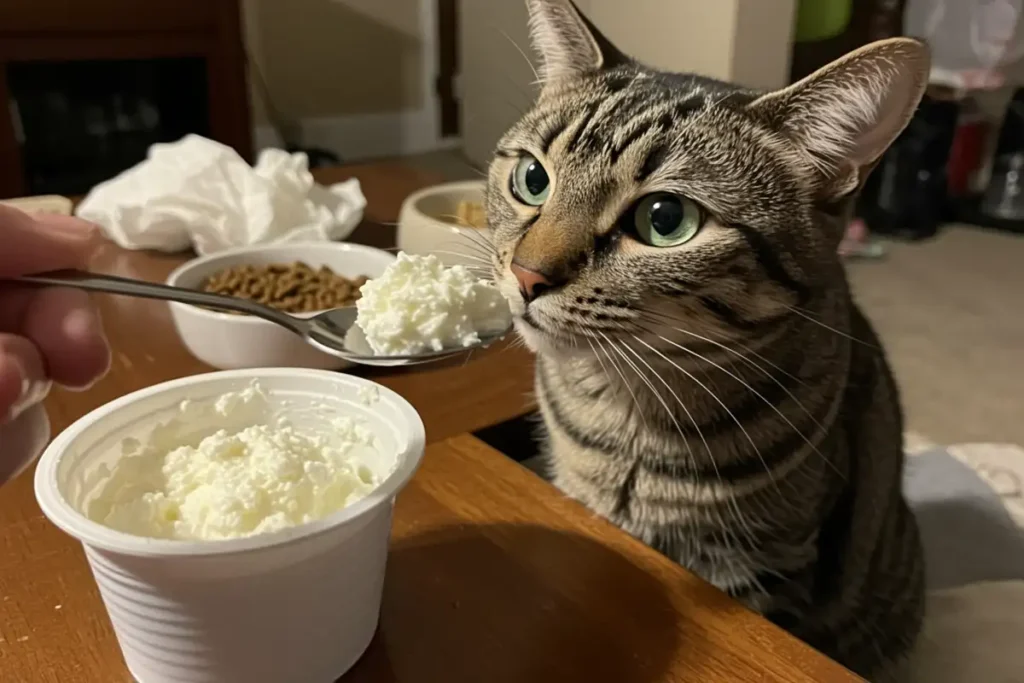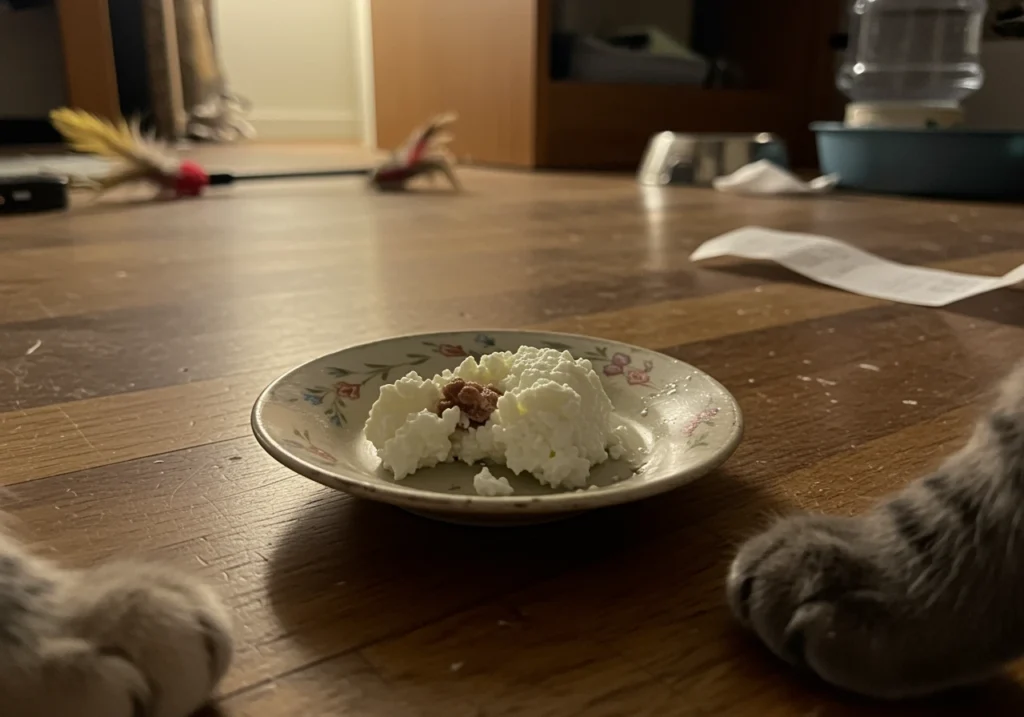let’s be real: we all love spoiling our furry friends with tasty treats. But when it comes to our feline companions, it’s crucial to know what’s safe and what’s not. So, the question on every cat owner’s mind is: can cats eat cottage cheese?
The answer, like with many human foods, isn’t a simple yes or no. Cottage cheese can be a safe and even beneficial treat for some cats, but it also comes with potential risks. It all depends on your individual cat’s health, dietary needs, and tolerance.
Before you go scooping out a spoonful for your kitty, let’s dive deep into the world of cottage cheese and cats. We’ll explore the potential benefits, the possible risks, and how to introduce it safely, so you can make the best decision for your feline friend. We’re talking about keeping our feline friends healthy and happy, and that starts with knowing what they can (and can’t) eat.
Potential Benefits of Cats Eat Cottage Cheese
So, why might you even consider feeding your cat cottage cheese in the first place? Well, it turns out that cottage cheese offers some potential health benefits for our feline companions:
- Good Source of Protein: Cats are obligate carnivores, meaning they need a diet rich in protein to thrive. Cottage cheese is a good source of protein, which is essential for building and repairing tissues, supporting a healthy immune system, and providing energy.
- Easy to Digest: Cottage cheese is relatively easy for cats to digest, especially compared to some other dairy products. This makes it a good option for cats with sensitive stomachs or digestive issues.
- Source of Calcium: Cottage cheese contains calcium, which is important for maintaining strong bones and teeth, as well as supporting nerve and muscle function.
- May Aid in Weight Gain: For underweight cats or those recovering from illness, cottage cheese can be a palatable way to add extra calories and protein to their diet, helping them gain weight.
- Can Be Used to Administer Medication: Some cats are notoriously picky eaters, making it difficult to give them medication. Mixing medication with a small amount of cottage cheese can make it more palatable and easier to administer.
Potential Risks of Feeding Cottage Cheese to Cats
Okay, so cottage cheese has some potential benefits, but what about the risks? It’s important to be aware of the potential downsides before offering it to your cat:
- Lactose Intolerance: Many cats are lactose intolerant, meaning they have difficulty digesting lactose, the sugar found in milk and dairy products. Cottage cheese contains lactose, although usually less than milk. Feeding lactose-intolerant cats cottage cheese can cause digestive upset, such as diarrhea, vomiting, and gas.
- High Sodium Content: Some brands of cottage cheese can be high in sodium, which can be harmful to cats, especially those with kidney or heart problems. Too much sodium can lead to dehydration, increased blood pressure, and other health issues.
- Allergies: Some cats may be allergic to dairy products, including cottage cheese. Allergic reactions can range from mild skin irritation to more severe symptoms, such as vomiting, diarrhea, and difficulty breathing.
- Weight Gain: While cottage cheese can be helpful for underweight cats, it can also contribute to weight gain in cats who are already overweight or prone to obesity.
- Not a Complete and Balanced Diet: Cottage cheese should never be used as a replacement for a cat’s regular food. It doesn’t provide all the nutrients that cats need to stay healthy, so it should only be offered as an occasional treat.
How to Introduce Cottage Cheese to Your Cat Safely
Okay, so you’ve weighed the pros and cons and decided you want to give your cat a taste of cottage cheese. Here’s how to introduce it safely:
- Start Small: Offer your cat a very small amount of cottage cheese – no more than a teaspoon – to see how they react.
- Choose Low-Sodium: Opt for a low-sodium or reduced-sodium variety of cottage cheese to minimize the risk of sodium toxicity.
- Plain is Best: Avoid cottage cheese with added flavors, fruits, or vegetables, as these may contain ingredients that are toxic to cats.
- Monitor for Reactions: Keep a close eye on your cat for any signs of digestive upset, such as diarrhea, vomiting, or gas. If you notice any of these symptoms, stop feeding cottage cheese immediately.
- Talk to Your Vet: Before introducing any new foods to your cat’s diet, it’s always a good idea to talk to your veterinarian. They can help you determine if cottage cheese is a safe and appropriate treat for your individual cat, based on their health and dietary needs.
Alternatives to Cottage Cheese for Cats
If you’re concerned about the potential risks of feeding your cat cottage cheese, there are plenty of other healthy and delicious treats you can offer instead:
- Cooked Chicken or Fish: Lean protein sources like cooked chicken or fish are always a good option for cats.
- Commercial Cat Treats: Choose high-quality commercial cat treats that are specifically formulated to meet your cat’s nutritional needs, For a comprehensive guide to feline nutrition and safe treatment options, visit this resource from VCA Hospitals. Always prioritize your cat’s dietary needs when choosing snacks.
- Plain Yogurt (in moderation): Some cats tolerate plain yogurt better than other dairy products, as it contains less lactose.
- Baby Food (Meat-Based, No Onion or Garlic): Plain meat-based baby food (without onion or garlic) can be a palatable and nutritious treat for cats.
FAQ About Cottage Cheese and Cats
How much cottage cheese can a cat have?
If your cat tolerates cottage cheese well, limit it to a tablespoon or less as an occasional treat (no more than a couple of times a week). Remember, treats should only make up a small portion of their overall diet.
Why does my cat like cottage cheese?
Cats are often attracted to the creamy texture and slightly salty flavor of cottage cheese. It can also be a novel and interesting food for them, which piques their curiosity.
Does cottage cheese help cats with diarrhea?
While some people believe that cottage cheese can help with diarrhea due to its blandness and protein content, there’s no scientific evidence to support this claim. In fact, for lactose-intolerant cats, cottage cheese can actually worsen diarrhea. If your cat has diarrhea, it’s best to consult with your veterinarian for proper diagnosis and treatment.
Can cats eat yogurt?
Plain, unsweetened yogurt, especially Greek yogurt, can be a better option than cottage cheese for some cats. Yogurt contains probiotics, which can be beneficial for gut health, and it often has less lactose than cottage cheese. However, it should still be given in moderation and avoided in lactose-intolerant cats.
Cottage Cheese – A Treat to Consider with Caution
So, can cats eat cottage cheese? The answer is maybe. While cottage cheese offers some potential benefits, it also comes with risks, especially for cats with lactose intolerance or sodium sensitivities.
The key is to introduce it slowly, choose a low-sodium variety, and monitor your cat for any adverse reactions. And, of course, always talk to your veterinarian before making any significant changes to your cat’s diet.
Ultimately, the best way to keep your cat healthy and happy is to feed them a high-quality, balanced diet that meets their individual needs. Cottage cheese can be a fun and occasional treat, but it should never be the foundation of their diet. Now go forth and spoil your kitty responsibly!


